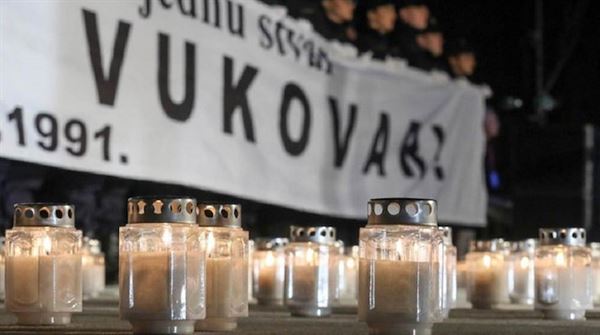Victims of the 1991 Vukovar massacre on Monday were commemorated on its 28th anniversary. Vukovar, close to Serbia on the River Danube, was the scene
Victims of the 1991 Vukovar massacre on Monday were commemorated on its 28th anniversary.
Vukovar, close to Serbia on the River Danube, was the scene of intense fighting following Croatia’s break from Yugoslavia.
Yugoslav soldiers together with Serb paramilitary troops kept Vukovar under siege for 87 days. Some days more than 11,000 bombs fell, the city passed into the hands of Serbian forces on Nov. 18, 1991.
Thousands of citizens, as well as Croatian state officials, attended the memorial service in Vukovar.
Croatian President Kolinda Grabar Kitarovic, Parliament Speaker Gordan Jandrokovic, Prime Minister Andrej Plenkovic also attended the ceremony in front of the hospital, the symbol of the Vukovar massacre where wounded were treated.
In his speech, Jandrokovic said that there was both a heroic epic and tragedy in Vukovar.
He stressed that those who died here sacrificed their lives to keep Croatia alive today.
Premier Plenkovic said Vukovar deserves special respect.
A memorial walk from the hospital was held to the memorial cemetery where the victims of the massacre were buried. Relatives of the victims and citizens laid flowers in the graves.
It is estimated over 3,000 people — mostly Croats — were killed and thousands more were kept in camps.
The city was virtually leveled during the siege.
The International Criminal Tribunal for the former Yugoslavia (ICTY) has sentenced former Yugoslav army officials Mile Mrksic and Veselin Sljivancanin to 10 years and 20 years in prison, respectively, for a massacre of civilians in the city.
After the war, Vukovar was placed under the UN administration and reintegrated into Croatia in 1998.
The Serbs’ invasion, which started after the siege, lasted until Jan. 15, 1998, while various war crimes were committed against the wounded and employees at the Vukovar Hospital.
According to the Vukovar Hospital, at least 1,624 people were killed, about 7,000 were taken to concentration camps, and around 22,000 non-Serbs, mostly Croats, were deported from the city.
The bodies of around 500 people, killed in Vukovar, have yet to be reached.
* Talha Ozturk contributed to this story from Serbia
